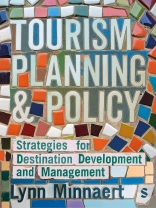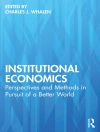Local, regional and national governments play an important role in how tourism destinations are developed and managed. But where do politics come in? How do organisations like the United Nations fit into this picture? And how does policy making work at the international level? All these questions and more are covered in this essential new textbook, with examples from destinations all over the world.
This concise and accessible introduction to tourism planning and policy making explores key themes around the strategic planning process, sustainability, ethics and inclusion in tourism, and future policy directions for tourism. Each chapter includes several snapshots and one case study to demonstrate how theory applies in practice, and ends with self-test questions to check your understanding.
This text is essential reading for all college and university students studying tourism, hospitality, events, and leisure and recreation studies.
Lynn Minnaert is the Dean of the School of Hospitality at the Metropolitan State University of Denver.
Cuprins
Chapter 1: Introduction
Section 1: The planning context
Chapter 2: The role of the public sector
Chapter 3: Political ideologies and their influence on tourism planning
Section 2: Strategic tourism planning
Chapter 4: The strategic planning process I: Mission, vision, the external and internal environment
Chapter 5: The strategic planning process II: Strategic directions, monitoring and evaluation
Chapter 6: In urban settings: Tourism, regeneration and gentrification
Chapter 7: International tourism planning and regulations
Section 3: Fostering sustainability, inclusion and ethics in tourism
Chapter 8: Sustainable tourism development
Chapter 9: Social tourism
Chapter 10: Accessible tourism
Chapter 11: Managing ethical challenges in tourism: Dark tourism and sex tourism
Section 4: Looking ahead
Chapter 12: Future directions for tourism planning and policy
Despre autor
Professor Lynn Minnaert is the Head of Subject, Tourism and Languages, at Edinburgh Napier University′s Business School. Her research specialism is social inclusion and social sustainability in tourism and events: she has conducted research projects into social tourism, the social impacts of the Olympics and social legacy initiatives in the meetings industry. She has lectured in tourism and events management at undergraduate and postgraduate levels in the UK, the US and in a range of different countries – this international perspective is reflected in this book.












